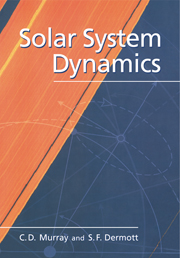Book contents
- Frontmatter
- Contents
- Preface
- 1 Structure of the Solar System
- 2 The Two-Body Problem
- 3 The Restricted Three-Body Problem
- 4 Tides, Rotation, and Shape
- 5 Spin–Orbit Coupling
- 6 The Disturbing Function
- 7 Secular Perturbations
- 8 Resonant Perturbations
- 9 Chaos and Long-Term Evolution
- 10 Planetary Rings
- Appendix A Solar System Data
- Appendix B Expansion of the Disturbing Function
- References
- Index
9 - Chaos and Long-Term Evolution
Published online by Cambridge University Press: 05 June 2012
- Frontmatter
- Contents
- Preface
- 1 Structure of the Solar System
- 2 The Two-Body Problem
- 3 The Restricted Three-Body Problem
- 4 Tides, Rotation, and Shape
- 5 Spin–Orbit Coupling
- 6 The Disturbing Function
- 7 Secular Perturbations
- 8 Resonant Perturbations
- 9 Chaos and Long-Term Evolution
- 10 Planetary Rings
- Appendix A Solar System Data
- Appendix B Expansion of the Disturbing Function
- References
- Index
Summary
Take but degree away, untune that string,
And hark what discord follows. Each thing meets
In mere oppugnancy.
William Shakespeare, Troilus and Cressida, I, iiiIntroduction
In this book we have derived a number of equations of motion to study the rotational and orbital motion of solar system objects. These equations have described either conservative systems, such as the two- and three-body problems, or dissipative systems, such as the equations governing tidal evolution or the dynamical effects of drag forces. However, all have a common characteristic: They describe systems that are deterministic. This means that the current state of the system allows us to calculate its past and future state providing we know all the forces that are acting on it. In the case of the two-body problem we were able to solve the equations of motion and calculate the behaviour of the system at all past and future times. A complete analytical solution was not possible in the case of the three-body problem and we had to rely on numerical solutions if we wanted to follow the orbital evolution of a test particle. However, there was an implicit assumption that, given the initial state of the system, we should be able to calculate its future state by obtaining solutions of the equations of motion. Unfortunately this assumption is not valid for some of the systems we have investigated and this is because of the phenomenon called chaos.
- Type
- Chapter
- Information
- Solar System Dynamics , pp. 409 - 473Publisher: Cambridge University PressPrint publication year: 2000
- 1
- Cited by



